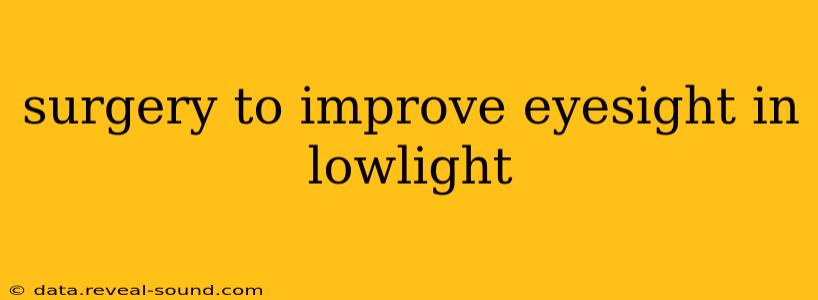Seeing clearly in low-light conditions is crucial for safety and enjoyment of everyday activities. While many factors influence night vision, some individuals experience significantly impaired vision in low light, impacting their quality of life. This article explores surgical options aimed at improving eyesight in low-light situations, outlining their effectiveness and limitations. It's important to remember that this information is for educational purposes only and should not be considered medical advice. Always consult with an ophthalmologist or optometrist for personalized recommendations.
What causes poor night vision?
Before diving into surgical options, it's vital to understand the underlying causes of poor night vision. This can range from simple refractive errors (easily corrected with glasses or contact lenses) to more complex conditions like cataracts, macular degeneration, or retinal diseases. Age-related changes in the eye also play a significant role, affecting the eye's ability to adapt to varying light levels. Furthermore, certain medical conditions and medications can indirectly contribute to poor night vision.
Can surgery improve night vision?
The answer is nuanced. While there isn't a specific surgery solely designed to enhance night vision, certain procedures address underlying conditions that indirectly improve vision in low light. The success of these surgeries depends heavily on the specific cause of the poor night vision.
Cataract Surgery
Cataracts, a clouding of the eye's lens, often lead to decreased vision, including impaired night vision. Cataract surgery involves removing the clouded lens and replacing it with an artificial intraocular lens (IOL). While primarily aimed at correcting blurry vision, many IOLs are designed to improve contrast sensitivity, potentially leading to better night vision. However, the degree of improvement varies depending on the individual and the type of IOL used.
Refractive Surgery (LASIK, PRK)
Refractive surgeries like LASIK and PRK correct refractive errors such as nearsightedness, farsightedness, and astigmatism. While these procedures don't directly address the physiological processes behind night vision, correcting refractive errors can significantly improve vision in all light conditions, including low light, by sharpening the image reaching the retina.
Other Surgical Interventions
In cases of specific retinal diseases impacting night vision, specialized surgeries might be considered. These surgeries are complex and often involve retinal specialists. The success rate and suitability for surgery depend largely on the nature and severity of the retinal condition.
Are there any non-surgical options for improving night vision?
Yes, many non-surgical options can improve night vision, often serving as the first line of defense before considering surgery. These include:
- Eyeglasses or contact lenses: Correcting refractive errors often significantly improves low-light vision.
- Vitamin supplements: Certain vitamins and antioxidants, such as lutein and zeaxanthin, are believed to support eye health and potentially improve night vision. However, their effectiveness remains a subject of ongoing research.
- Lifestyle changes: Maintaining a healthy diet, getting enough sleep, and avoiding excessive alcohol consumption can contribute to overall eye health.
What are the risks and complications associated with surgery for improved eyesight?
As with any surgery, there are potential risks and complications associated with procedures aimed at improving eyesight. These can include infection, inflammation, dry eyes, and, in rare cases, vision loss. A detailed discussion of risks and potential complications should be undertaken with your ophthalmologist before any surgical intervention.
What questions should I ask my doctor about improving my night vision?
This is crucial. Before making any decisions about surgery, you should have a comprehensive consultation with an eye care professional. Ask about:
- The cause of my poor night vision: Identifying the root cause is the first step in determining the best course of action.
- All available treatment options: Discuss both surgical and non-surgical options.
- The risks and benefits of each treatment option: Understand the potential benefits and drawbacks of any procedure.
- My candidacy for surgery: Determine whether you're a suitable candidate for any surgical intervention.
- Expected outcomes and recovery time: Get a realistic expectation of the potential improvement and recovery period.
By understanding the causes of poor night vision and available treatment options, you can make informed decisions with your eye doctor to improve your vision in low light and enhance your quality of life. Remember, consulting with a qualified ophthalmologist is crucial for personalized advice and a safe approach to treatment.
